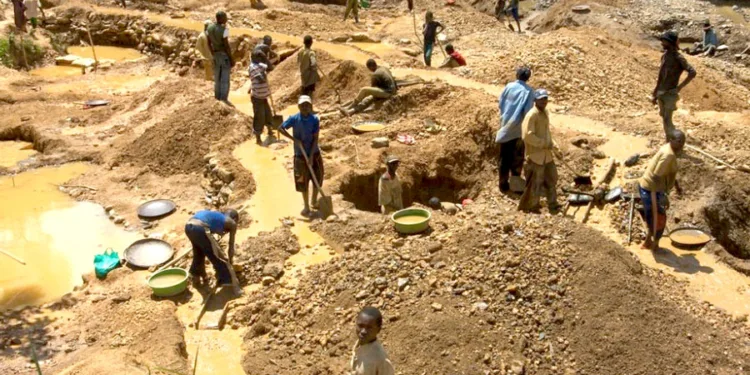In Ethiopia, seven individuals were arrested and detained by the police for trying to access a gold mining site in the Moyale, Marsabit County of the country.
This indicates an intensified crackdown on illegal mining operations amid growing security issues.
This arrest incident closely followed the arrest of five miners at the same location, emphasizing the efforts of law enforcement to curb illegal operations and unauthorized entry into Kenya.
During a routine patrol along the Moyale-Dabel road, law enforcement officers apprehended seven citizens of Ethiopia attempting to access a gold mining site.
This incident occurred just a day after another group of miners was also caught at the same location. The suspects were found in possession of various excavation tools, which were confiscated by the police.
The suspects face charges under the Public Order Act for engaging in illegal mining activities and being in Kenya without the necessary authorization.
This crackdown on illegal mining comes in the wake of escalating security concerns and follows a recent visit by Interior Cabinet Secretary, Kiture Kindiki to the area.
During his visit, Kindiki ordered the closure of gold mining sites in Marsabit, designating them as dangerous zones.
This decision was prompted by violent clashes among miners that resulted in the tragic death of seven individuals.
The government of Ethiopia’s swift action underscores its commitment to maintaining law and order in mining areas and addressing the associated risks and challenges.
The illegal activities and violent clashes that happen frequently at the mining sites in the region pushed the government to take practical steps to restore order as revealed by the Interior Cabinet Secretary, Kiture Kindiki.
Also Read: Everything You Should Know About Angola’s Partnership With China
What Was The Response Of The Government To Illegal Mining In Ethiopia?
To curb the escalating violence and criminal activities, including drug trafficking, rape, and other gender-based violence at the Dabel Artisinal Mining Sites, the Interior Cabinet Secretary of Ethiopia announced a thirty-day vacation of the sites.
Kindiki’s order covers the ban of any presence or activity in the mapped-out areas without written authority from the County Police Commander, Marsabit County.
“Under Section 8(1) of the Public Order Act, Cap 56 of the Laws of Kenya, and Section 106(1) of the National Police Service Act, no person may be found present in the areas specified in the Gazette Notice at any time without the written authority of the County Police Commander, Marsabit County,” he said.
A special team from the Directorate of Criminal Investigations (DCI) has been tasked with investigating the incidents and apprehending offenders, signalling a comprehensive approach to tackling the issue.
The recent arrests and the decisive actions reflect the intolerance of the government of Ethiopia to address security concerns in gold mining operations along the Kenya-Ethiopia border.
By organizing a total clean out of the specified areas where the crimes are perpetrated, the government aims to quell the violence and criminal activities that have plagued the region.
The situation in Marsabit County serves as a critical point of reflection on the challenges of managing natural resources, ensuring security, and upholding the law in areas prone to illegal activities and cross-border criminality.
Earlier in the month, another set of criminals and illegal Ethiopian migrants were apprehended at the Kenya-Ethiopia border. A group of eighteen were arrested in Korondile Township days after they had arrived from the border.
Upon their arrest, they told the law enforcement officials that they had been ferried into Ethiopia through the border by a smuggler who was to pick them up for Nairobi and later to Tanzania and South Africa.
They were charged to court on March 15 where the law enforcement officers sought to take permission to deport them to their home country.










